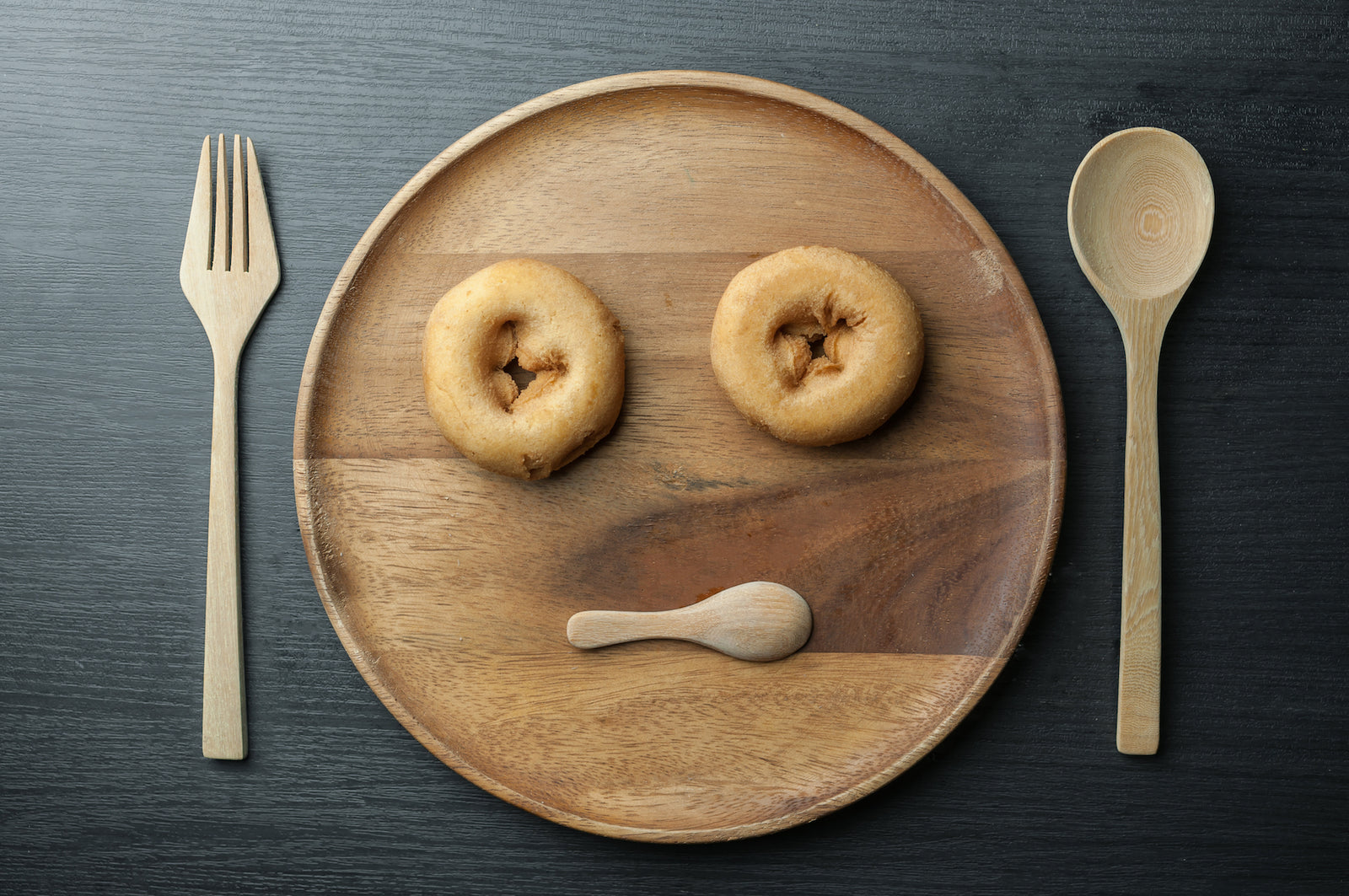Big food and American food culture have led to an incessant need to turn to food as an emotional crutch for millions of people. Are you really embracing food if you’re slowly eating yourself sick? Probably not. The key here is that emotional eating is a choice. It’s a Band-Aid for facing emotions, events, and hardships in life. It’s convoluting the difference between hunger and emotion and using food as an anxiety drug. Food is there to be consumed, not to consume you. So why do people emotionally eat? How do you stop emotionally eating? And how do you manage to get through life’s rough patches without turning to food? Whatever the problem is the answer is not in the fridge. And we’re going to tell you why.
What Is Emotional Eating
Emotional eating is often defined as (over)eating in response to a negative affect (Thayer, 2001) without specificity to particular moods or emotions (Faith, Allison, & Geliebter, 1997). Rather than eating to satisfy physical hunger, individuals participate in eating to satisfy or soothe emotional needs.
We’re all guilty of turning to a pint of ice cream or a carb-filled meal like pasta or even swinging through the drive-through when we’re feeling down or stressed out. Other times, individuals may turn to food as a reward system, like going for a Slurpee after a workout, chomping on a candy bar after a successful meeting because ‘you earned it’, or having a pastry because you ate well all week.
While using food as a ‘reward’ isn’t necessarily a bad thing if it’s your primary coping mechanism to celebrate or to harm, the real problem at hand isn’t being addressed. Emotional eating doesn’t heal emotional issues. Food is fuel – not therapy. But for some, giving into binges, cravings, and urges becomes a habitual loop that’s been wired into your brain.
Why Is Emotional Eating Harmful
Binge eating and emotional eating never solved a world war and reality is this – it’s not going to solve your life issues, either. When this happens over and over again, a cycle is developed, literally shutting down normal hormone secretion and physical signs of hunger. The nervous system tells the adrenal glands to produce epinephrine (aka adrenaline), triggering the body’s fight-or-flight response, that temporarily suppresses hunger in an effort to ‘survive’.
From a physiological standpoint, negative events and emotions in life can trigger the stress hormone, cortisol (read more about cortisol HERE), which can increase the body’s desire for high-fat, sugary “comfort foods”, shutting down the body’s ability to discern between stress eating and true hunger. Cortisol can increase motivation, including the motivation to turn to temporary distractions, such as food and the motivation to eat. Comfort foods and cravings lead to increased weight gain, increased stress or cortisol levels, decreased overall health and functioning, loss of sleep, exercise, and the desire to consume alcohol. (Harvard)

Emotional Eating Causes
Curious what is the cause of emotional eating? You’re not alone. Here are a few emotional eating causes that most individuals can easily relate to.
1. Unconscious Eating
Ever find yourself at dinner with friends, you get full, you’re engaging in conversation, and yet you’re still picking at your food and eating it? Ever have a friend say, “I thought you were full, why are you still eating” to which you reply “I’m not sure”? This is the unconscious consumption of food. Another way of looking at it is snacking – tiny little foods that you can pick up with your fingers, like nuts or candy that sits out on a table.
Newsflash - you’re not eating it because you’re hungry. You're not being mindful of what you're eating. Ask yourself, ‘why do I want that?” and if you tell yourself it’s because you want it, or the M&Ms are colorful, or that the nuts are salty, or you’re anxious or upset, it’s probably a great idea to not eat it, because you’re not really hungry2. Food Can Be Soothing
Looking forward to a big meal or a savory treat can be exciting. Like cracking open a nice, cold beer at the end of a long, sweaty, and hot workday can be soothing, some look to ice cream and sugary foods for the same feeling – it’s a soothing tactic for being stressed out, overworked, and experiencing not so pleasant emotions. While food can indeed be a smoothing technique, it is always short lived and can turn into a hard-to-kick habit really quick.
Sweet and sugary foods release opioids in the brain, which happen to be the very same opioids that are released when individuals use narcotics (think cocaine and heroin), justifying the claim that sugary foods can physiologically and temporarily soothe hormones and emotions that are derived from cortisol and other stress hormones released by the body. If food is pleasurable to you, or literally the only pleasure in your life, and you find yourself literally eating your feelings, it’s time to come to terms with your emotional eating and seek help. If you cannot kick the habit on your own, we recommend seeking help from a professional or a trusted physician. (Kromberg)
3. It's Normalized
Part of the normalization of using food as an emotional comfort and why it’s normalized in our culture is because of the media. How many times have you seen a girlfriends get together after a breakup, consoling one another with ice cream, wine, and popcorn? Social media is no exception here – ever find yourself gawking at someone’s body you would like to look at, telling yourself you’ll never look like them, then putting down the phone and grabbing something from the fridge only to exacerbate your body image worries?
Seems silly at first, but when you really dive into it, eating may feel good in the now, but are you really dealing with your emotional issues that triggered the eating? Probably not. Discerning between the psychological effects of eating to cope with feelings, such as the ones portrayed by media, means understanding a box of chocolates isn’t going to fix your breakup and neither is a bottle of wine and ice cream with your girlfriends.The Difference Between Emotional Hunger vs Physical Hunger
Emotional hunger is extremely powerful, almost as powerful as physical hunger. As we’ve learned so far, emotions can induce the desire to consume food. Mistaking emotional hunger for physical hunger leads to many problems down the road so here are our most helpful ways to discern between the two.
- Urgency – physical hunger gradually introduces itself whereas emotional hunger is the incessant need to consume something. If it feels dire to eat and to be satisfied, chances are you’re feeling emotional hunger.
- Cravings – physical hunger doesn’t crave foods and if you’re actually hungry, chances are your human instinct is going to want to consume food without being picky about it in order to survive. Emotional hunger does just the opposite – the hormone release incites the desire for sugary, simple carb filled foods to fulfill a void.
- Mindless Eating – finding yourself uncomfortably satisfied? Chances are you’re coping for something. When your body receives a balanced and nutrient rich meal, you don’t have to be stuffed like a pig to know when you’re done.
- Guilt – physical hunger originates in the belly. If your tummy grumbly? That’s a good thing! That means you’re physically hungry. Emotional hunger stems from the brain, and if you’re eating out of guilt and shame, you should probably take a step back and look at what really is causing you to feel that way in the first place (secret tip – it’s not the food making you feel that way).
How To Overcome Emotional Eating
The first step to overcoming emotional eating is to understand your emotions. If you eat when you’re upset, you will end up with two problems: the problem that made you upset in the first place and now the additional problem of feeling bad about yourself and what you just ate. Try discovering your emotional eating triggers as you feel them and write them down. Learn from them as they happen since it’s not exactly possible to stop them all together.
Chances are that the foods individuals turn to when they emotionally eat, they do enjoy. So don’t cut them out all-together. If you like cheese, put cheese on your eggs in the morning and move on. Don’t eat the whole cheese block at 2pm when you hit an afternoon mental road block.
Looking for more beneficial ways to deal with your feelings and emotions can also help keep your hands out of the cookie jar, literally. Go for a walk, take a bath, go get a pedicure, drink a cup of tea, call a friend, because there are plenty of other beneficial ways of dealing with stress.
Freedom from Emotional Eating
The moment you stop trying to fill the emptiness inside with food is the moment you begin to break free from emotional eating. And on top of that? Curing emotional eating doesn’t come from removing comfort foods, snacks, or treats. It comes from learning how to comfort yourself, your emotions, your issues, and the events you experience in life. In order to establish a healthy relationship with your body, it requires changing your relationship with food, too. It’s time to swap pigging out for listening up and overcoming emotional eating, cravings, and binging. This is called self-care and the ability to eat in a way which makes your body feel food, while you work in other ways to keep your mood and spirit feeling good, too.
Need Help With Optimizing Your Diet, Nutrition, And Training Plan To Finally Get The Results You've Been Waiting For?
SWOLVERINE IS AN ENDURANCE ATHLETE AND ACTIVE LIFESTYLE BRAND. MADE FOR THE ELITE ATHLETE, AND THE STRONG-WILLED OUR PRODUCTS WERE DESIGNED TO FUEL YOUR ATHLETIC PERFORMANCE. WE PERFORM WHEN YOU PERFORM.
We believe that everyone can optimize not only their athletic performance but their human potential. The way we believe we can optimize performance is through transparency, clinically effective doses, and clinically proven ingredients with evidence-based outcomes. We provide the nutrients you need to power your active lifestyle.














